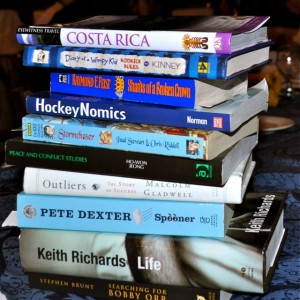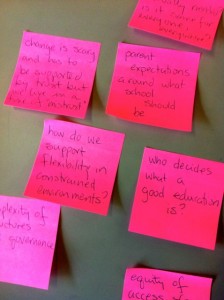Posts Tagged ‘university’
So You’re a TA, eh?
I’m very pleased to be back at Simon Fraser University (SFU) this term as a Teaching Assistant (TA) with the Department of English. I am leading two tutorial sections for English 104W – “Introduction to Prose Genres: Digital Perspectives on Canada’s Media History and Messaging as a Prose Genre” with Dr. Paul Matthew St. Pierre.
For those of you who follow me on Twitter or on Facebook, you may guess why I’m particularly excited about being a part of this course. Given how much time I currently spend on social media, the course is a way to consider my online practice in a historical and cultural context.
I anticipate that the course content will support what I’m doing, it’ll challenge what I think, and it’ll motivate me to ensure my social media activities are pursued in an even more thoughtful manner. With three lectures done already, I foresee that Dr. St. Pierre may be setting the stage for us to consider our time on social media as “work” within the digital sphere and electronic devices as the tools by which we complete that work.
To think of my time online as work adds a whole new dimension to my role as a digital citizen.
Aside from grounding my social media use in this context, I’m really excited about having the opportunity to work with undergraduate students again.
Why?
It’s not because of the marking, which is likely my least favourite aspect of the job, although assessment is important in the university environment.
It’s not for the office I get to use since it’s remarkable how infrequently students stop by to visit.
It’s not for the authority which the position bestows upon me although it’s wonderful to be able to think about the tutorial sessions as “my classes” and those enrolled as “my students”.
It’s because as I work with the students I feel — I hope — I’m making a contribution to their learning. From exhorting them to look up words in a dictionary, to pushing them to care about writing, to asking them to see beyond the words on the page (or on the screen), I’m trying to show them that they have agency in this world.
I want them to know that their agency will be based on their ability to read, reflect, think, challenge, analyze, and communicate. It doesn’t matter what their career aspirations may be, it doesn’t matter which field of work they intend to pursue, it doesn’t matter what subjects they may wish to study, these are the abilities which will serve them well in any career, in any field, in any subject area.
That is, I want them to value learning, I want them to value thinking, and I want them to know that the ability to fully realize their potential depends on their ability to focus on more than just their grades and to look beyond the message no matter the form.
And in working with them, I recognize that I value my work as a TA because it allows me to do the same with regard to my own agency.
It allows me to recognize the following:
- I’m not so much a person who accepts as I am someone who questions.
- I’m not so much a teacher as I am a student.
- I’m not so much a person who imparts knowledge as I am a learner.
For life.
Time May Not Care But I Do
December looms. The last month of the year. I can only wonder how it is that 2013 has just over four weeks to go.
The months have flown by, the year has evaporated. Like the contrails of planes which soar overhead, all that’s left are lingering impressions of passing through space and time. I know I started there and I know I’ve ended up here, but I’ve lost the texture of the days and won’t remember all the details of my experiences along the way.
Time’s not going to hesitate in its relentless march to give me back the days or weeks or minutes or seconds I wasn’t able to enjoy or forgot to savour.
Time doesn’t care, but I do.
Why?
 Because the end of the year means the end of the semester at Simon Fraser University (SFU) and while time may not care that it’s left me breathless with its bruising speed, I do care about having to say goodbye to the students I’ve been working with since the first week in September.
Because the end of the year means the end of the semester at Simon Fraser University (SFU) and while time may not care that it’s left me breathless with its bruising speed, I do care about having to say goodbye to the students I’ve been working with since the first week in September.
There are any number of reasons for me to be ecstatic. Once exams are over and grading is done, I won’t have to contend with the agony of marking. Once the last book has been read and the last office hour held, I may be able to reintroduce balance in my day to day activities. Once the demands have lessened, I might be able to capitalize on a few extra hours of sleep.
I have many reasons to celebrate. But here’s the thing. All of those reasons and more are trumped by this one truth: I treasure working with undergraduates even if they hand in papers late, even if they won’t contribute to a class discussion, even if they haven’t done the reading, even if their writing skills are still in development, and even if they don’t care as much about the course as I do.
Based on concentrated interactions over 12 to 13 weeks, even if it’s just for 50 minutes each week, a connection is established although not with every student and not always successfully. A rapport grows among the members of each tutorial group, a sense of common purpose.
And for me the most rewarding moments are those times during a tutorial session when I can actually see the students thinking. When it seems like they are puzzling over a new idea, a new concept. Of course, they may just be squinting at the clock in anticipation of being released from the torture of sitting in yet another classroom with yet another TA droning on about something or the other. Maybe. But more often than not, I feel they’re giving serious consideration to the material at hand. They are learning and their horizons are expanding.
My time with these students is rapidly coming to an end and I’m incredibly appreciative of the time I’ve been privileged to spend in their company.
It may be brief, it may be over all too soon, but it’s time well-spent.
Connections? Priceless
In today’s opening essay for Q, the CBC radio show, host Jian Ghomeshi remembered Roger Ebert and the interview he conducted with the famed film critic a year ago.
Jian described how concerned he’d felt about his ability to connect with Mr. Ebert in the studio given the latter’s health challenges. “I needn’t have,” he said.
His words this morning paid tribute to the man, but they also served as a testament to the power of connection.
Listening to Jian made me reflect on my own feelings now that the spring term at SFU is drawing to a close. I’m not completely disentangled from my teaching obligations yet: I’m expecting final essays from my students next week.
But there are no further lectures for the course and no remaining tutorials. And that makes me wistful.
Why?
Because the end of the term represents a loss. The connections I’ve forged with my students after thirteen weeks of working together are now tenuous if not severed. I may have gained back time for my own work and my other commitments, but I am no longer a part of these particular journeys, the unfolding lives of these particular individuals.
Since my first stint as a TA, I’ve connected with approximately 120 students. 120 students from a variety of faculties and departments, given the way course requirements are structured at SFU, and 120 students who represent the gamut of undergraduate experience.
Aside from the occasional encounter on campus, I don’t know where they are now or what they are doing or how they are faring.
When I walk around the Burnaby campus now, a movie reel of sorts plays out in my mind: momentary flashes of memories, frames filled with faces, snippets of conversations, disappointments, and noted accomplishments.
The characters of my movies are students: those with strong opinions, those with a sense of humour, those who struggled, those who exceeded their own expectations, and those who were observers yet offered so much when they found the courage to voice their opinions.
The plot revolves around classic texts of Western civilization and delving for insights into the human condition, then and now. Work on writing, developing critical thinking skills, and trying my best to impart the importance of questioning.
A few students have reconnected via LinkedIn and others lurk on Twitter, but these electronic tentacles, in my mind, pale in comparison to the strength of the collective experience of an in-person weekly seminar or a personal visit during office hours.
My experience at SFU has strengthened my belief that the most critical factor in teaching and learning is the personal aspect. Technology may carry us forward into a brave new world where the nature of human interaction is fundamentally altered forever, and learning is transformed into something which I am not yet able to imagine, but for now it remains as it always has been.
The value of educational experiences rests predominantly, as it does for radio interviews, on human connections.
What’s In A Word?
In 2010, I was accepted into the Graduate Liberal Studies (GLS) program at Simon Fraser University (SFU).
Going back to school, part-time, was one of the best decisions I’ve ever made. In addition to reentering the world of study and immersing myself again in the humanities, my status as a Masters student allowed me to apply for Teaching Assistant (TA) positions at SFU. I’ve been fortunate to serve as a TA in the Department of Humanities for four terms.
I love being a TA. I love attending lectures and brushing up on familiar subjects and topics or delving into new ones. I love the dialogue with students in tutorial — especially on those days when they decide to leap into the discussion — and I love the challenge of trying to figure out how to engage them in texts so that they see how a work that’s centuries old does have relevance to their world today.
And I love playing a role, however small, in helping them develop their writing skills. However, I’m frustrated by the general level of writing I’ve encountered in these courses especially since the participants represent the gamut of undergrad experience, from level one to level five or higher.
It’s more than a question of writing. Although we live in an age of literacy, it seems to me to be a question of reading.
Why?
 Because in a world where information is literally at our fingertips, students do not take the time to search out a reference in a literary work or to look up a word.
Because in a world where information is literally at our fingertips, students do not take the time to search out a reference in a literary work or to look up a word.
A simple check in a dictionary app or online could make all the difference in the interpretation of a passage from a primary document or a novel or a philosophical treatise.
A simple Google search can tell you more than you’d ever need to know about a name or time which adds layers of meaning to assessing an author’s intent or understanding a character.
And I find that I can pick out the words which students will most likely not have understood or not have taken the time to investigate, with eerie accuracy, even if they are what I would consider simple words for someone studying at the post-secondary level.
The latest such word was “pious”.
The professor I’m working with this term used the word during his lecture. He was talking about characters or figures who, albeit pious, face serious consequences in their lives. That is, the tragedies with which they contend are not a reflection of their personal morality, but are often a reflection of their time and the socio-cultural values of their societies. That’s a much more sophisticated analysis than saying they were “bad” or “unlucky”.
What’s in a word?
The world is in a word.
A world of meaning is embedded in a word, a world of interpretation, a world of understanding.
Words by the Bee Gees (1968)
You think that I don’t even mean
A single word I say
It’s only words and words are all I have
To take your heart away
